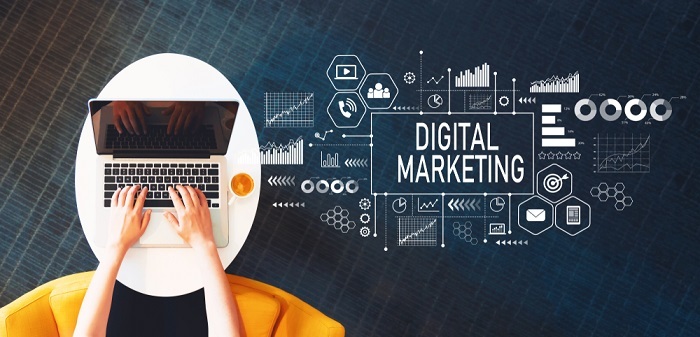
 Data Structure
Data Structure Networking
Networking RDBMS
RDBMS Operating System
Operating System Java
Java MS Excel
MS Excel iOS
iOS HTML
HTML CSS
CSS Android
Android Python
Python C Programming
C Programming C++
C++ C#
C# MongoDB
MongoDB MySQL
MySQL Javascript
Javascript PHP
PHP
- Selected Reading
- UPSC IAS Exams Notes
- Developer's Best Practices
- Questions and Answers
- Effective Resume Writing
- HR Interview Questions
- Computer Glossary
- Who is Who
Future of Internet and Digital Marketing: Will it Die Out or Evolve?
Since the early years of the internet, internet/digital marketing has advanced significantly. Businesses began recognizing the Internet's promise as a new marketing platform in the early 1990s. However, the early phases of Internet marketing were extremely constrained and primarily centered on email marketing and simple website design. Marketers started experimenting with new forms of advertising as the internet gained popularity and more people started using it.

Search engines like Google and Yahoo rose to prominence in the internet marketing industry in the late 1990s and early 2000s. Pay-per-click (PPC) advertising and search engine optimization (SEO) were both influenced by this. These methods assisted companies in improving their search engine rankings and increasing targeted website traffic.
How Much Has Digital Marketing Evolved Since the Beginning?

A new era of Internet marketing began in the mid-2000s with the emergence of social media. Businesses were able to interact with clients in real-time on social media sites like Facebook and Twitter and develop a devoted following. As a result, social media marketing was developed, which involves producing content and advertisements, especially for social media websites.
Internet/digital marketing has advanced further in the modern era. Marketers now have more opportunities than ever to connect with consumers thanks to the growth of mobile devices and the Internet of Things (IoT). In recent years, strategies including influencer marketing, content marketing, and video marketing have grown in popularity.
Overall, the evolution of Internet/digital marketing has been driven by advances in technology and changes in customer behavior. The discipline of Internet/digital marketing will probably continue to develop and adapt to new trends and problems as new technologies are developed.
Will Digital or Internet Marketing Eventually Become Extinct?
It is extremely improbable that digital marketing on the internet will go away in the future. The market is always changing and adjusting to new technical developments, shifting consumer trends, and regulatory settings. While internet/digital marketing has become a crucial component of contemporary business, conventional marketing channels may still have a position in particular sectors of the economy.
It is obvious that internet/digital marketing will only become more significant in the future due to the growing relevance of online presence and e-commerce. The industry may alter and develop, but it is unlikely to completely vanish.
Internet/Digital Marketing Trends and Predictions: The Current Scenario
Internet/digital marketing is currently in a state of perpetual evolution, adjusting to new trends and technologies. Several current trends and forecasts for Internet/digital marketing are listed below ?
Machine Learning and Artificial Intelligence (AI)
Internet/digital marketing is increasingly relying on AI and machine learning. These technologies can be applied to the analysis of consumer information and behavior, personalization of content and advertising, and campaign optimization.
Vocal Search
Voice search is growing in popularity as smart speakers and virtual assistants become more common. Marketers should think about creating speech-activated products and apps as well as optimizing their content for voice search.
Video Marketing
The use of video on the internet and digital marketing is becoming increasingly important. Videos may be utilized to effectively express a brand's story since they are captivating and memorable.
Influencer Marketing
Social media influencers are still quite popular, and many firms work with them to advertise their goods and services.
Personalization
Marketers must meet customers' expectations for personalized experiences. Data analysis, artificial intelligence, and machine learning can all help with personalization.
Privacy Issues
Customers place more and more importance on data privacy. Marketers need to be upfront about data gathering and use and employ strong data security procedures.
In the future, it is expected that Internet/digital marketing will continue to be driven by technical breakthroughs, changes in customer behavior, and the need for personalized experiences. The best marketers will be those who keep up with current trends and adjust to new difficulties.
Pros and Cons of Examining Alternatives to Internet/Digital Marketing
There are still other marketing channels that companies can utilize to reach their target audience, even if Internet/digital marketing has become a crucial component of contemporary business. The followings are some advantages and disadvantages of looking at alternatives to Internet/digital marketing ?
Pros
Tangibility ? Internet/digital marketing cannot match the physical presence that traditional marketing methods like print ads or billboards offer.
Local Focus ? Traditional marketing avenues are frequently more effective at focusing on particular local markets.
Faith ? Consumers frequently place greater faith in traditional marketing methods like print advertisements than they do in the Internet or digital marketing because they have been around for a long time.
Niche Markets ? Internet/digital marketing may not be as effective for organizations that target niche markets as traditional marketing methods.
Cons
Limited Reach ? For companies that aim to reach a worldwide audience, traditional marketing channels may have a limited reach.
High Costs ? The production and distribution of traditional marketing tools like radio or TV commercials can be pricey.
Results Can Be Difficult to Track ? Unlike internet/digital marketing, traditional marketing channels can be challenging to monitor for efficacy.
Limited Interactivity ? Compared to Internet/digital marketing, traditional marketing channels do not offer the same level of interaction and engagement.
Businesses should look towards traditional marketing methods to support their marketing efforts even if internet/digital marketing is frequently the most efficient approach to reach a large audience. Businesses can develop a complete marketing plan that makes use of all accessible channels by knowing the advantages and disadvantages of each technique.
The Future of Internet/Digital Marketing: Potential Impacting Factors
There are several elements that could possibly have an impact on the industry as internet/digital marketing continues to change and develop. Here are some important variables that could have an impact on how Internet and digital marketing developments in the future ?
Technology advancements ? New digital marketing channels and strategies are likely to appear as technology continues to advance. As a result of these changes, marketers will need to keep their plans current.
Consumer Behavior Changes ? Consumer behavior is always changing, especially as younger generations grow more tech-savvy. In order to effectively reach these audiences, marketers will need to be aware of these shifts and modify their methods.
Regulatory Shifts ? The legal framework governing digital and internet marketing is always evolving. For instance, data privacy laws like the CCPA and GDPR have significantly changed how digital marketing is done. Marketers will need to keep up with these changes and make sure they are in compliance with all pertinent laws.
Economic Conditions ? The success of Internet/digital marketing efforts can be significantly impacted by economic conditions. It may be harder for marketers to increase sales when there is economic uncertainty since consumers may be less likely to make purchases.
Rivalry ? As the internet/digital marketing sector expands, there will certainly be more rivalry. In order to stand out from the crowd and successfully target their target demographic, marketers will need to create innovative strategies.
The Final Verdict
In the near future, it is extremely improbable that internet/digital marketing would go extinct. In order to effectively reach its target audience, the industry will adapt and develop new methods as technology and consumer behavior continue to change.
However, internet/digital marketing has taken over as a crucial component of contemporary business, and its significance will only increase. Traditional marketing channels may still have their place. As a result, companies should keep spending money on Internet/digital marketing to maintain their position as market leaders in the rapidly evolving digital space.

